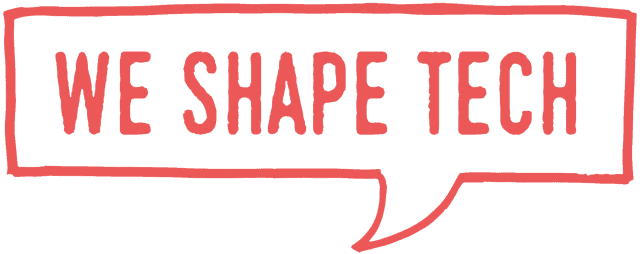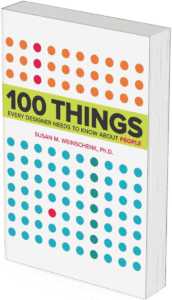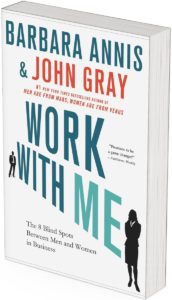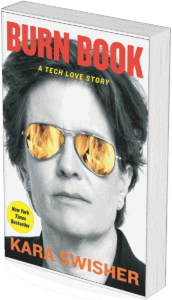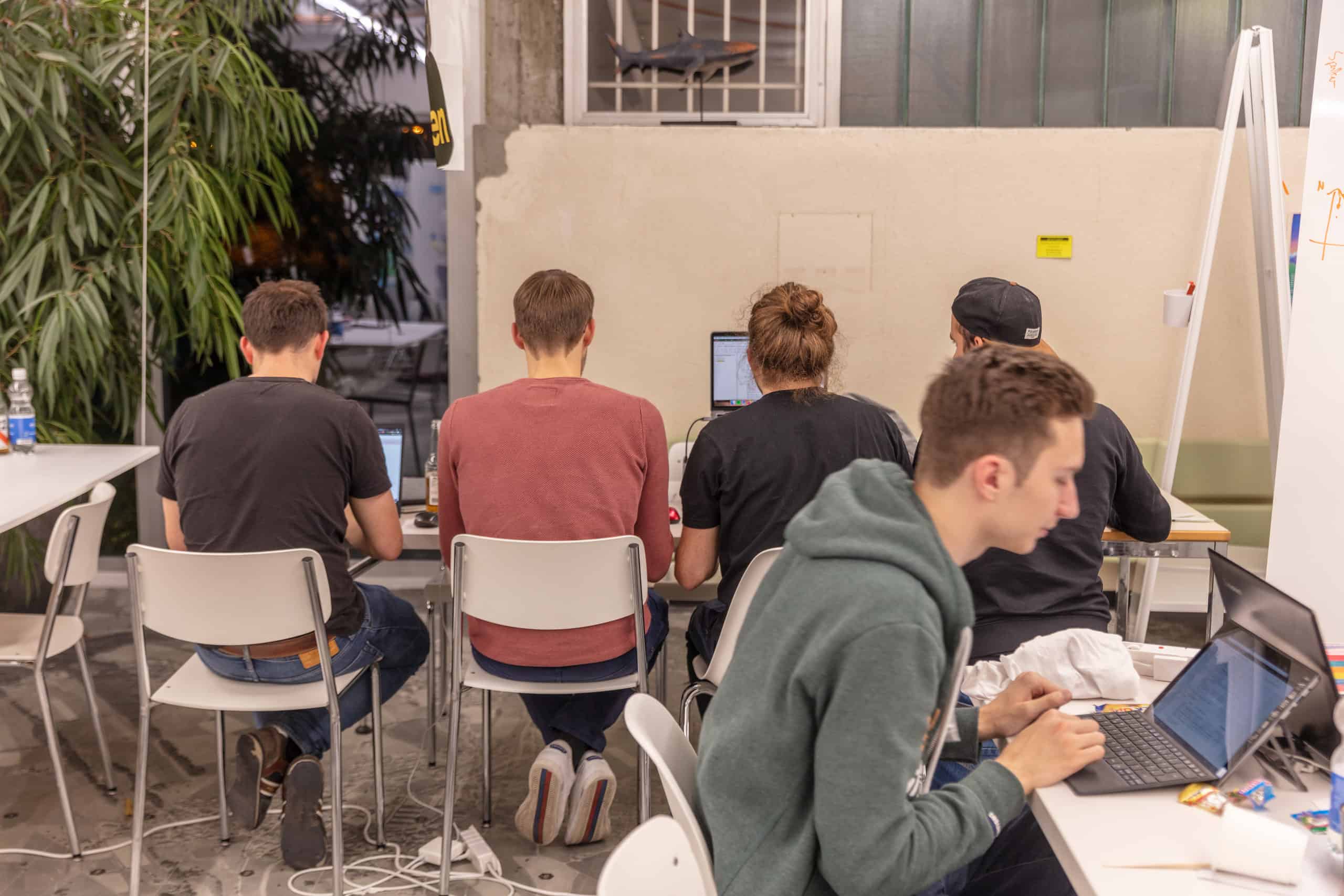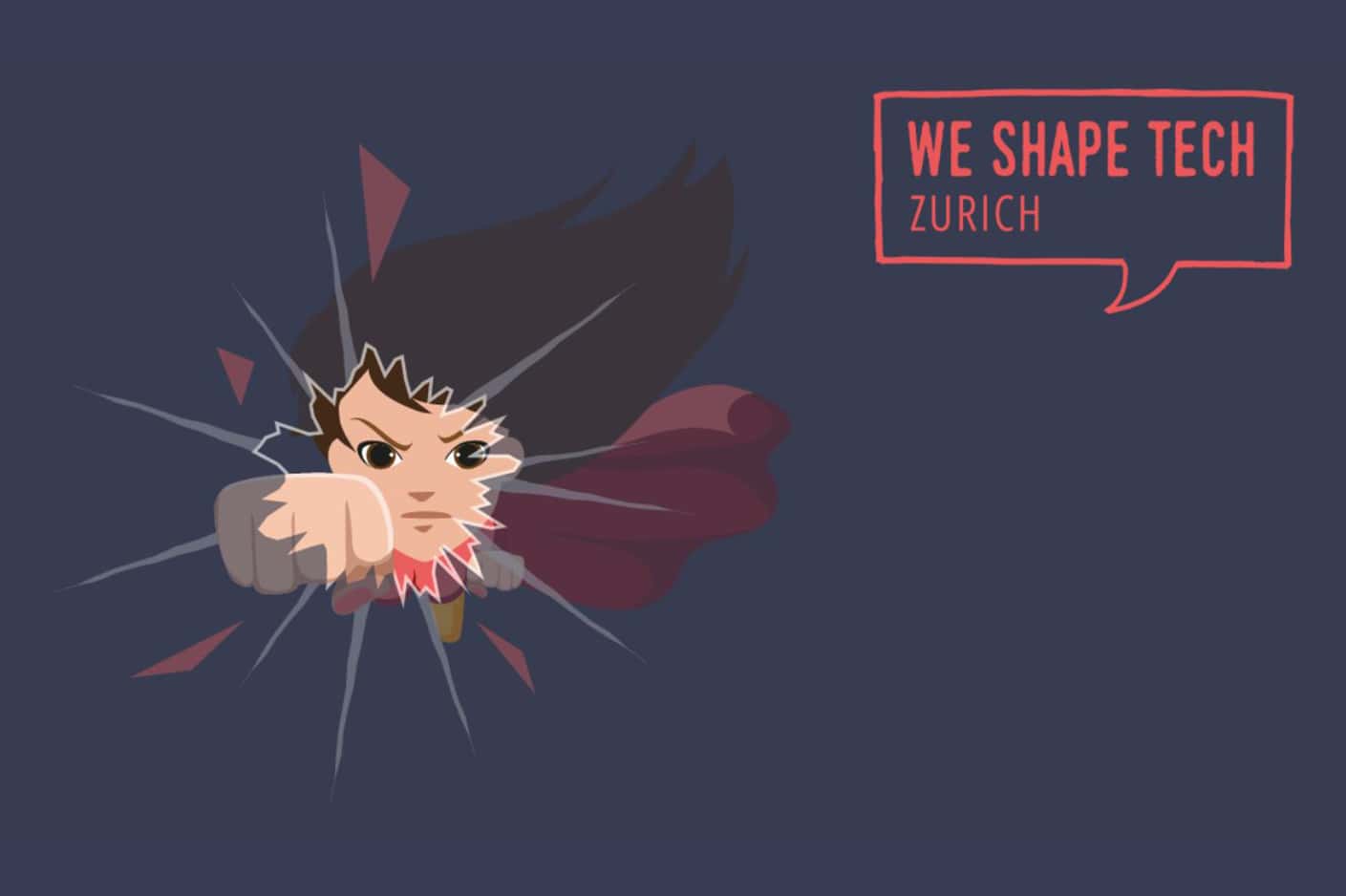June is Pride Month, and like every year, you can expect some serious rainbow coloring on everyone’s sites, pages, social media channels, and even on buildings. Even corporates have understood, even if just through clients pressuring them, that the LGBTQIA+ community is a target group that needs to be seriously considered. But while many talk the talk, very few walk the talk. With new concepts like “rainbow washing” popping up more and more, we decided to explain some terminology and to have an in-depth talk about pride, rainbow washing, and other related terms with an expert in our network: Katharina Wohlrab, CEO of Tech4Girls and FLINTA* in STEM.
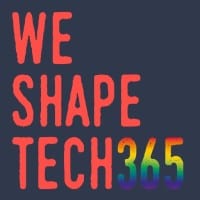
In 2021, the board of We Shape Tech got annoyed enough by companies waving their rainbow flags only during June, that we started the hashtag #diversity365 and changed the WST label on social media to one including a rainbow colored 365 (here on the left) as a statement, that diversity is not a month-long exercise but something to be lived 365 days a year.
With the upcoming Pride Month, we encourage everyone to question flying rainbow flags, ask critical questions about a company’s true commitment and to speak out publicly about rainbow washing.
Jump directly to terminology if you need to brush up on the abbreviations or terms used. Otherwise: enjoy the interview!
Interview with Katarina
Katharina, thank you for agreeing to this interview on the eve of what is the most important time of the year for the LGBTQIA+ community!
Let’s start with what you think is the state of diversity in general and the level of inclusion of the LGBTQIA+ community in work- and everyday life today. “Are we there yet”?
We’re definitely not there yet, but we’re on our way. I haven’t had any discriminating experiences in the work field, but at the same time, my wife and I are so used to being discriminated against because of our identity, that sometimes we don’t even recognize it as such.
What does Pride Month mean to you personally?
Pride Month to me is just a regular month, to be honest, it’s actually more of a regular month than any other month because it is finally a time where queer people are represented in media.
Pride Month is as colorful as the rainbow symbolizing LGBTQIA+, but by now it’s probably almost as lucrative for companies to attract new followers and buyers as some holidays throughout the year, isn’t it?
In 2019, LGBT adults globally held a combined buying power of approximately $3.7 trillion, according to Wikipedia
I couldn’t agree more. A funny anecdote about my wife and I is that both of us sometimes get booked as models. Most of the time it’s because of pride campaigns and many times we get discriminated against because we don’t look how straight people imagine lesbians to look like.
So agencies invite us to castings, and the companies get to meet us and tell us afterward, that it would have been nice if at least one of us looked, stereotypical gay. Can you imagine? Getting discriminated while being discriminated?
Just because it’s called Pride “Month” doesn’t mean you don’t have to make an effort all year long. What kind of change would you like to see more of in companies?
I feel like the companies who decorate themselves with rainbows in Pride Month don’t even know what being an ally means.
From a company that uses the rainbow, we definitely expect more than a few colored sweets. We want donations to LGBTQIA+ organizations and political engagement as well as an understanding of what being queer means in a society that mostly isn’t. At the same time, having a LGBTQIA+ board at the company is really important to be an ally; it shows the queers that they are safe and gives them space to speak about their wants and needs.
Rainbow washing – with such a strong symbol for diversity and inclusion, I was aghast to realize that there truly is no shame in using it for profit without true engagement. Why is rainbow washing so damaging?
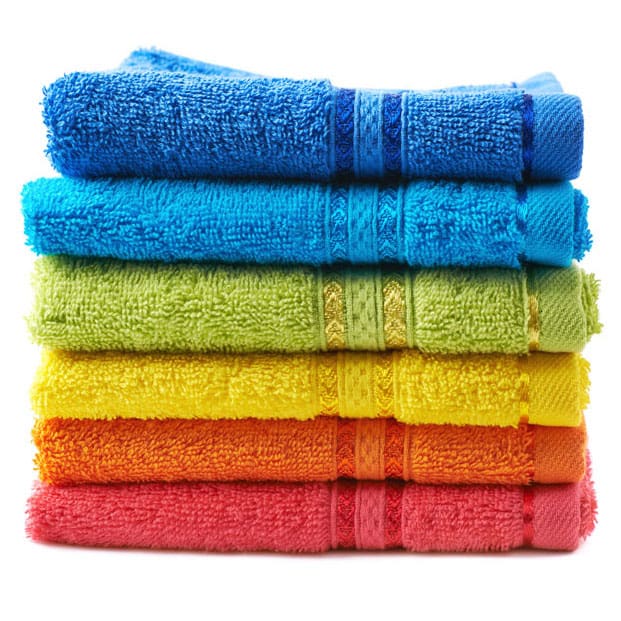
Rainbow washing is really damaging for the community because companies are making a profit off of our identity while not supporting us otherwise.
At the same time, when seeing rainbows everywhere, companies are faking their allyship, which can lead to queer people trusting in the company and getting disappointed or even worse.
When you decorate a company with a rainbow in June, it’s important to ask yourself, what else are we doing for the LGBTQIA+ community? Are we doing enough? Is our company a safe space for queer people? How can we improve?
What do you recommend people do if they realize a company or person is rainbow washing (self-staging) themself?
Source: Pressrelations (German)
Probably not support the companies. Sounds easier than it is, but by buying all those pride sweets and sweaters, you support something that isn’t real. And we aren’t stupid, we find out if a company isn’t an ally.
I was at a loss of words when I heard that UEFA refused to display rainbow colors on the Munich stadium in 2021 in reference to them being a “politically and religiously neutral organization.” Now in 2022, they suspended Russian players from all football competitions.
We see inclusion as a social, economic, and equality topic, not a political one, while an invasion is clearly politically (and economically) motivated. Do you have any thoughts on the whole topic of how inclusion has to be classified?
We were shocked as well and at the same time, it wasn’t shocking at all. I can tell you something quite personal: My wife and I are planning our future, and we definitely want to become parents. When asking my health insurance if they’d support us while doing IVF (in-vitro-fertilization) they told us, that Germany doesn’ allow health insurance to support us while our first trial. Berlin supports queer married couples with their second or third trial IVF, but not with the first.
When you’re straight, and you ask your health insurance to support you financially on your first trial, they send you a form, and you get supported. When you’re queer, you have to pay for everything yourself. And it’s a lot of money. So that’s how political it is to be queer.
One aspect few people think about is all the Pride-branded apparel that is sold, often by companies who do not even have LGBTQIA+ people woven into their supply chains. As a part of the LGBTQIA+ community, do you feel the message/promotion for inclusion on the apparel justifies buying without asking the supply chain question, or do you feel it should still be asked?
It’s funny when straights think they know best about what gays need. I was once asked while giving a talk about FLINTA* in STEM if I could bring my rainbow flag. At first, I thought the person was joking, but she wasn’t. She was expecting every queer person to own a rainbow flag. Like, when you know you’re queer, you have to fill out a form and when you get accepted they gift you all the pride souvenirs.
One thing many LGBTQ+ people have to deal with – sometimes on a daily basis – are haters: People who leave nasty comments, behave homophobically, share unwanted and hateful opinions or make distasteful jokes. Do you have any advice on how to react to haters?
Seek help in your community or with HR if you are unsure how to deal with a specific case of a hater.
Always be aware that there is nothing wrong with your identity and you do not have to put up with people like that.
Don’t let hateful comments break your stride or let them bring down your self-worth. You’re dealing with somebody with issues – and they’re not your issues 😉
Think twice before engaging in a discussion with haters. All they want is a reaction. Why satisfy them?
Expose them. It’s what I do, when I experience discrimination, I take a picture of the message or post and then repost it. And when it gets really bad, report them.
When I was on TV for a German dinner show, I got really mean threatening messages, and I didn’t even wait a second before reporting those people to the Berlin police.
Discrimination is no opinion and I will not tolerate any of it.
Thank you, Katharina, for sharing your thoughts and tips with the WST community!

Katharina Wohlrab is the executive director of the non-profit organization Tech4Girls and lives in Berlin with her wife and their three dogs. She is a Sensefluencer, Mental Health activist and volunteers for animal welfare. She also has a podcast on mental health and self-love and writes for the online feminist magazine imGegenteil. She is very structured and is remarkably good at parking and baking vegan cakes.
Self-Staging or
True Believer?
Are you trying to determine if a company or organization is truly doing their part in diversity and inclusion or only rainbow washing? We have collected some questions you can ask yourself to help you determine if you’re dealing with a “self-stager” or “true believer”:
How long-term and sustainable are the advertising efforts?
If the marketing efforts are focused on June, you might be dealing with a self-stager. If it’s happening throughout the year: they’re still in the race for true believer.
Is the company’s marketing consistent in terms of solidarity with the queer community?
Check the public relations of the respective company: do they communicate across the board in the same way? Do they make public statements about how they feel about diversity in general and LGBTQIA+ in particular?
When does the company publish statements about solidarity with the LGBTQIA+ community? Which time during the year does the company show “their” rainbow colors?
Have LGBTQ+ influencers made statements on social media that the company wanted to advertise but didn’t want to pay for it (“we’re doing it to help you”)?
Can you choose “diverse” instead of “Mr./Ms.” on contact or application forms on the company’s website?
How do companies deal with queer employees internally? Do they offer a safe workplace for queer people? Are queer people paid equally?
If you hear or read (e.g. in Kununu) about discrimination of queer employees… that’s your answer: self-stager!
Does the company run Pride campaigns while contributing to or endorsing anti-LGBTQIA+ groups or people?
Does the company have dedicated FTE’s and budgets for diversity topics?
Terminology
Ally
The status or role of a person who advocates and actively works for the inclusion of a marginalized or politicized group in all areas of society, not as a member of that group but in solidarity with its struggle and point of view and under its leadership.
FLINTA*
FLINTA is the acronym for Female, Lesbian, Intersexual, Non-binary, Transgender & Agender.
LGBTQIA+
Please see our previous post The ABCs of LGBTQ if you feel unsure about the terminology of the gender identities behind the characters of this abbreviation. We also recommend reading our posts about The Importance of Pronouns, our Tips to Be More Inclusive in Our Language and the Inclusive Language Guide (with Femme Palette). Might as well educate yourself 😉
Pink Money
Pink money refers to the purchasing power of the LGBTQIA+ community. In 2019, LGBTQ adults globally held a combined buying power of approximately $3.7 trillion, making them a highly attractive target group and one of the reasons why companies commit rainbow washing.
Pink Washing
Pink washing is often used as a synonym for rainbow washing. The term pink washing comes from marketing campaigns by US cosmetics and pharmaceutical companies advertising with pink ribbons on their products to draw attention to the fight against breast cancer even while their products were suspected of causing breast cancer.
Since then, the term “pink washing” has been used in the broadest sense to criticize the marketing strategies of companies that claim to stand up for minority rights.
Pride Month
There is a reason why Pride Month takes place every year in June. It commemorates the Stonewall Uprising in the summer of 1969, which is now considered a milestone in the LGBTQIA+ movement. It was the first known uprising of queer people against police brutality in New York.
Rainbow Washing
The term “rainbow washing” is a neologism made up of “rainbow” and “whitewashing” and is used to criticize the marketing strategies of some companies. The accusation is that they pretend to support the LGBTQIA+ community with the help of rainbow-flag-laden advertising, but do not pursue any serious interest in improving the situation of queer people, let alone staying on top of the issue and improving the situation throughout the year.
While there isn’t a common definition of what exactly falls under rainbow washing, one could describe it as a form of mimicry: imitation of solidarity for a short or long time rather than truly meaning (and doing) it.
White Washing
The first known use of the term “whitewash” dates back to 1591 in England. Whitewash is a cheap white paint/coating of chalked lime that was used to quickly give a uniform clean appearance to a wide variety of surfaces, such as the interior of a barn.
Today, whitewashing is the act of glossing over or covering up vices, crimes or scandals to the abandonment of a tarnished identity and creation of a blank one. Or in other terms: make something crappy look good.

